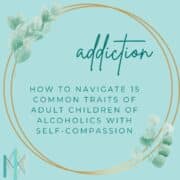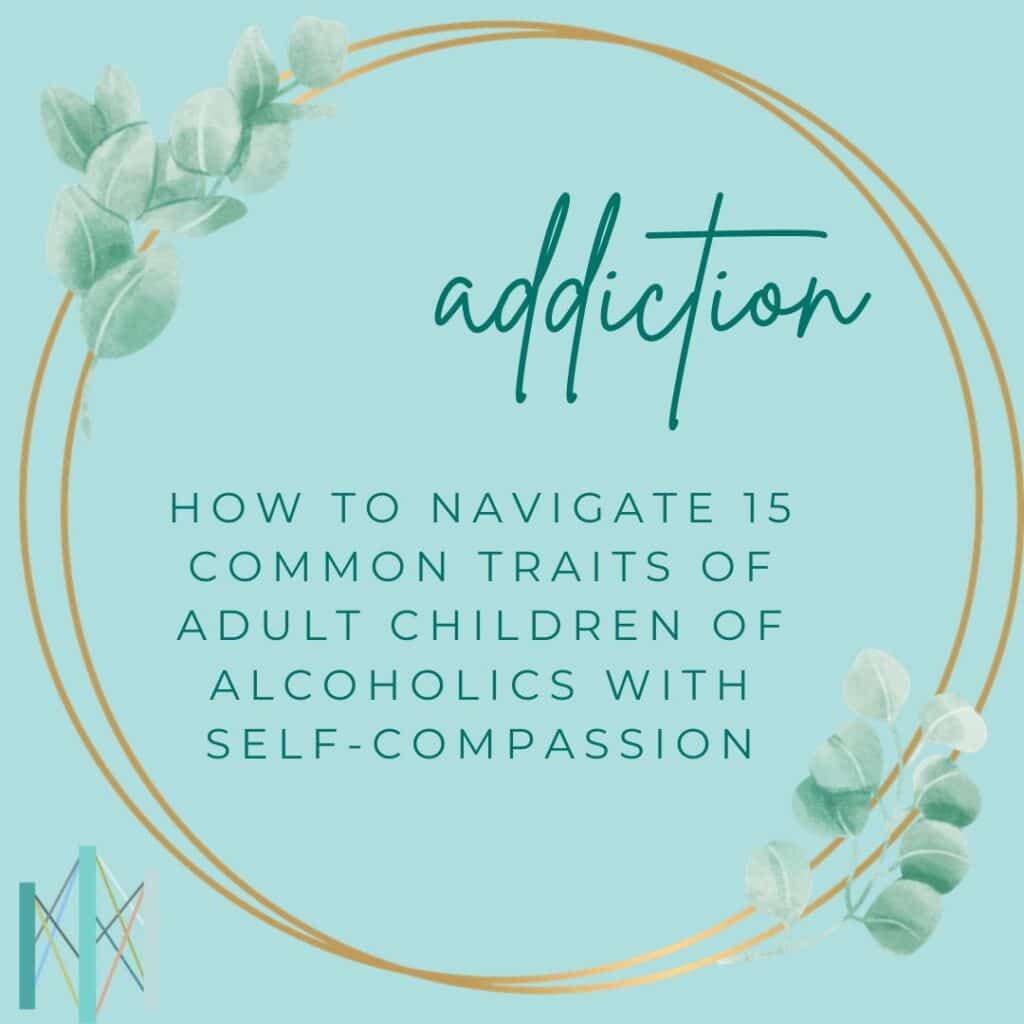

Growing up in a household with alcohol or substance abuse can leave deep emotional imprints. As an Adult Child of an Alcoholic (ACoA), you may carry patterns that once helped you survive but now create challenges in your relationships, career, and self-esteem. Recognizing these traits is the first step. Navigating them with self-compassion is how healing begins.
Browse our Therapist Directory
15 Self-Compassion Practices for Common Traits of Adult Children of Alcoholics
Here are 15 common ACoA traits and ways you can work through them with care and kindness toward yourself:
1. Difficulty Trusting Others
Adult Children of Alcoholics often grow up in unpredictable environments, making it hard to trust. Broken promises and inconsistent caregiving can lead to suspicion or over-vigilance in relationships.
Self-Compassion Strategy: Acknowledge that mistrust kept you safe. In therapy, explore how to build trust slowly with those who have earned it.
2. Overdeveloped Sense of Responsibility (People-Pleasing)
Many ACoA become caretakers early in life, feeling responsible for family dynamics. As adults, they may struggle to say no or prioritize their own needs.
Self-Compassion Strategy: Practice setting small boundaries and remind yourself that your needs matter as much as others’.
3. Fear of Abandonment
Having experienced emotional or physical abandonment as children, ACoA may become overly attached or fearful of loss in adult relationships.
Self-Compassion Strategy: Develop self-soothing techniques and remind yourself that relationships can be secure without constant reassurance.
4. Perfectionism and Self-Criticism
Growing up in chaos often leads ACoA to believe they must be perfect to be loved or safe. Mistakes may trigger deep shame.
Self-Compassion Strategy: Allow yourself to be human. Celebrate progress over perfection and recognize that mistakes are a part of learning.
5. Difficulty Identifying or Expressing Emotions
Adult Children of Alcoholics often suppress emotions due to family dynamics where feelings were ignored, ridiculed, or unsafe to express.
Self-Compassion Strategy: Journaling or mindfulness can help you name and validate your emotions without judgment.
6. Intense Fear of Conflict
Because conflict at home was destructive or unpredictable, many ACoA avoid confrontation, even at their own expense.
Self-Compassion Strategy: Remember that healthy conflict can deepen relationships. Practice assertive communication with trusted people.
7. Impulse to Control Situations or Others
Living in an unpredictable household often leads to a desire for control as a way to feel safe.
Self-Compassion Strategy: Work on tolerating uncertainty with grounding techniques and therapy. Let go of the belief that you are responsible for managing others’ behaviors.
8. Hyper-Independence (“I don’t need anyone”)
A survival mechanism for many ACoA is to rely solely on themselves, avoiding vulnerability.
Self-Compassion Strategy: Reframe vulnerability as strength. Therapy can help you build supportive relationships while maintaining your independence.
9. Deep Loneliness (Even in Relationships)
Many ACoA experience a profound sense of isolation, even when surrounded by people.
Self-Compassion Strategy: Cultivate community with people who understand you. ACoA support groups or group therapy can provide connection without judgment.
10. Struggles with Self-Esteem and Self-Worth
Growing up in an invalidating environment often leaves ACoA feeling “not enough” or deeply flawed.
Self-Compassion Strategy: Affirm your inherent worth. Therapy can help you challenge negative self-beliefs and nurture self-acceptance.
11. Difficulty Relaxing or Having Fun
Adult Children of Alcoholics often grow up hyper-vigilant, making it hard to let their guard down or experience joy.
Self-Compassion Strategy: Start small. Engage in playful activities without productivity goals and notice what brings you joy.
12. Attraction to Dysfunctional or Unavailable Partners
Familiar patterns often feel safe, even when they’re painful. ACoA may unconsciously recreate family dynamics in romantic relationships.
Self-Compassion Strategy: Learn your relationship patterns in therapy and practice choosing partners who are safe and emotionally available.
13. Tendency to “Numb Out” Through Work, Screens, or Substances
Coping mechanisms like overworking, binge-watching, or drinking often emerge as ways to avoid difficult emotions.
Self-Compassion Strategy: Notice your numbing habits without shame. Explore healthier coping strategies with a therapist.
14. Persistent Anxiety or Hypervigilance
Living in a chaotic household can lead to a nervous system that is constantly on high alert.
Self-Compassion Strategy: Practice grounding techniques, like deep breathing or somatic therapy, to help calm your body’s stress response.
15. Feeling “Different” or Like You Don’t Belong
Adult Children of Alcoholics often feel out of place, as if no one truly understands their experiences.
Self-Compassion Strategy: Recognize that you are not alone. Therapy and ACoA communities can provide validation and belonging.
10 Ways Therapy Helps ACoA Navigate These Traits with Compassion
Living with the patterns and wounds developed in childhood can feel isolating, confusing, or even impossible to change. But therapy offers more than just coping skills—it offers a path to self-understanding, healing, and new ways of relating to yourself and others. Here are some of the ways therapy can support Adult Children of Alcoholicson their journey of self-compassion and healing:
1. Providing a Safe, Non-Judgmental Space for Your Story
For many ACoA, childhood was marked by chaos, unpredictability, or a lack of emotional safety. Therapy offers a space where you can share your experiences without fear of criticism or dismissal. It’s a space to be heard, believed, and understood—often for the first time.
2. Exploring How Your Past Shapes Your Present
Therapists can help you connect the dots between childhood experiences and current patterns. For example, you may unpack why you feel responsible for others’ emotions or why intimacy feels both desirable and frightening. With understanding comes choice—the power to decide which patterns serve you and which you are ready to release.
3. Building Self-Compassion and Reducing Self-Blame
Many ACoA carry deep shame or a harsh inner critic, believing that they are “too much” or “not enough.” Therapy introduces self-compassion practices that help you soften your inner dialogue and treat yourself with the kindness you’ve always deserved.
4. Developing Healthier Coping Mechanisms
If you’ve relied on numbing behaviors, people-pleasing, or overachievement to survive, therapy can help you build new tools for self-regulation. Modalities such as Cognitive Behavioral Therapy (CBT) and Dialectical Behavior Therapy (DBT) teach skills for managing anxiety, setting boundaries, and responding to triggers with intention rather than reactivity.
5. Healing Trauma Stored in the Body
Childhood experiences of neglect, emotional abuse, or unpredictability can create trauma that lives in the body. Somatic therapies—such as EMDR (Eye Movement Desensitization and Reprocessing), breathwork, or body-focused techniques—help release trauma stored in your nervous system. This can reduce symptoms like chronic tension, hypervigilance, or emotional numbness.
6. Supporting Healthier Relationships and Boundaries
Many ACoA struggle with codependency, fear of abandonment, or repeating harmful relationship patterns. Therapy helps you explore your relationship history and practice setting clear, healthy boundaries without guilt. You’ll also learn to identify red flags and foster deeper, more secure connections based on trust rather than survival patterns.
7. Inner Child and Parts Work to Reclaim Self-Connection
Therapies like Internal Family Systems (IFS) or Gestalt Therapy help you reconnect with the younger parts of yourself—the parts that learned to survive through perfectionism, control, or withdrawal. Through dialogue with these parts, you can acknowledge their pain, release their burdens, and integrate them into a more whole and compassionate self.
8. Addressing Perfectionism and Fear of Failure
If you learned that success was your way to earn love or safety, therapy can help you shift from self-criticism to self-acceptance. With the support of a therapist, you can redefine success on your own terms and learn how to embrace your humanity—flaws, mistakes, and all.
9. Cultivating Joy, Play, and Self-Expression
Growing up in a household where chaos or survival was the focus can stifle joy and creativity. Therapy is not only about healing pain—it’s about reclaiming joy. Through expressive therapies (such as art therapy, dance, or creative writing) or simply through self-exploration, therapy helps you connect with the playful, curious parts of yourself.
10. Building Community and Reducing Isolation
ACoA often feel like they are the only ones who experience these patterns, but this is far from true. Therapy may include referrals to ACoA groups, 12-step programs, or group therapy where you can build a support network of people who understand your journey.
Browse our Therapist Directory to Find an ACoA Therapist Today




